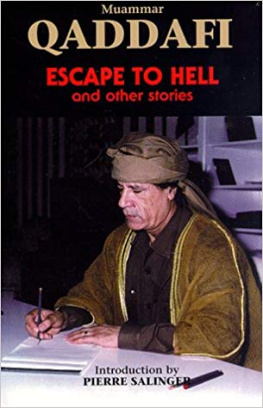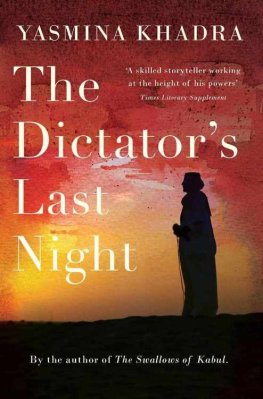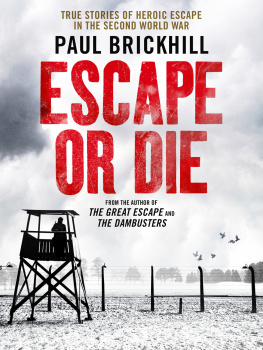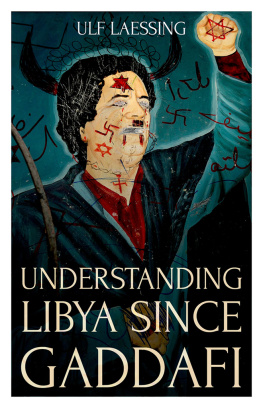Muammar Gaddafi - Escape to Hell and Other Stories
Here you can read online Muammar Gaddafi - Escape to Hell and Other Stories full text of the book (entire story) in english for free. Download pdf and epub, get meaning, cover and reviews about this ebook. year: 1998, publisher: Stanke, genre: Religion. Description of the work, (preface) as well as reviews are available. Best literature library LitArk.com created for fans of good reading and offers a wide selection of genres:
Romance novel
Science fiction
Adventure
Detective
Science
History
Home and family
Prose
Art
Politics
Computer
Non-fiction
Religion
Business
Children
Humor
Choose a favorite category and find really read worthwhile books. Enjoy immersion in the world of imagination, feel the emotions of the characters or learn something new for yourself, make an fascinating discovery.
- Book:Escape to Hell and Other Stories
- Author:
- Publisher:Stanke
- Genre:
- Year:1998
- Rating:4 / 5
- Favourites:Add to favourites
- Your mark:
- 80
- 1
- 2
- 3
- 4
- 5
Escape to Hell and Other Stories: summary, description and annotation
We offer to read an annotation, description, summary or preface (depends on what the author of the book "Escape to Hell and Other Stories" wrote himself). If you haven't found the necessary information about the book — write in the comments, we will try to find it.
Escape to Hell and Other Stories — read online for free the complete book (whole text) full work
Below is the text of the book, divided by pages. System saving the place of the last page read, allows you to conveniently read the book "Escape to Hell and Other Stories" online for free, without having to search again every time where you left off. Put a bookmark, and you can go to the page where you finished reading at any time.
Font size:
Interval:
Bookmark:
Escape to Hell a nd other stories
Introduction
This fascinating book is full of information about the life, past and future, and views of Muammar Qaddafi, on the world.
As we move toward the next century, Libya, through its leader Muammar Qaddafi, is seen as one of the most dangerous countries in the world. It is seen as revolutionary, irresponsible, fanatic, and terrorist. Nations do not believe that there have been dramatic changes in the past years, and are not interested in starting dialogue with Libya. Their only interest lies in isolating the nation. And yet, there have been dramatic changes that the western world should understand.
We should look back to recent history. In April 1986, the Reagan administration decided to bomb the capital of Libya, Tripoli, to try to assassinate Qaddafi. The reason for the bombing was, according to the administration, a Libyan terrorist attack against Americans in Berlin. During the bombing of Tripoli, hundreds of Libyans were killed, including one of Qaddafi's children.
A few years later, the American and British governments, after investigations into the Pan Am 103 bombing in December 1988, decided that the bomb had been placed on a plane in Malta that connected to Pan Am in Frankfurt, Germany, and exploded over Lockerbie in Scotland. In their investigations, the two governments were aware that the bombing had been carried out by Iran and Syria. After the Gulf War, these governments wanted to see progress in the Middle East peace talks between Israel and Arab countries and the Palestinians. They decided to change their decision and attribute responsibility for the Pan Am bombing to Muammar Qaddafi. The reason was that the Syrians, and not the Libyans, were crucial to Middle East peace talks.
I was the only one who interrogated the two Libyan suspects for planting the bomb in Malta. That interrogation confirmed to me that the Libyans had not done it, that the bomb was put on the plane in Frankfurt, and, more interestingly, I discovered that Libya had made important changes. For example, while in Libya I was allowed to visit an area that the Americans said was being used to create chemical weapons. When I went there, it was clear that they were not creating such armaments. I was allowed to visit areas where the U.S. government had proclaimed as terrorist training camps. They had been put to a stop and turned into places of residence for Palestinian immigrants. Moreover, I discovered that Ibrahim Beshari, then foreign minister of Libya, had written letters to the United Nations and to U.S. secretary of state James Baker, offering them the possibility to send in investigators to verify that what the Libyans were saying was true. Neither the United Nations nor the U.S. government replied. On the other hand, the Libyans were in touch with the British government to let them know they were ready to give important information on how, in the past, they had supported the activities of the Irish Republican Army in its military operations in Northern Ireland, although they were no longer supporting them. The British accepted the offer and learned important things through the Libyan intelligence services.
All of these views had an impact on the views of Muammar Qaddafi. In a discussion we had in 1992, he denied all of the charges against his country. He said: "Our feeling is that our country has become a victim of terror, particularly from the United States (during the Bush administration). We are starting to feel strong persecution complex from America. Libya is becoming a bottle of Pepsi Colathey shake it and shake it until it explodes." In this book, Qaddafi makes it clear that he and his regime are totally opposed to communism. In my interview, he said that his country had never been a danger to the U.S., and in fact that they had refused to accept communism, for which the U.S. should have been grateful. In the essay Is Communism Truly Dead? he writes that Marxism Leninism was completely false and a dramatic mistake, and is something that has its roots in the French revolution. He denounces its origin and its methods.
Finally, Qaddafi told me: "We can go back to the language of reason and dialogue and that is also explained by the differences between presidents Bush and Reagan. As far as comparing between the attack on Libya by Reagan and George Bush's involvement in the Gulf War, there was a difference. Bush went to the world and obtained UN resolutions. He got allies. Reagan did not, convinced that he should make his own decision." Qaddafi, of course, recently said that with the second term of the Clinton administration, he was confident that there would be changes between the U.S. and Libya. In this he may not be right.
The collection of works by Qaddafi is interesting. Qaddafi's Libya has exerted much effort in making sure that an Islamic fundamentalist movement does not take power. Obviously, Islamic fundamentalism has made a strong appearance in nations bordering Libya. There is the violent civil war in Algeria, with 60,000 killed already, and the rising current of Islamic fundamentalism in Egypt. If Libya were to allow Islamism to rise, it would explode into its neighbours and the rest of North Africa.
While other nations detest Libya, they do not understand that when Muammar Qaddafi took power he effected huge changes in restructuring the nation to make sure that there were no homeless people or unemployed or badly paid citizens. Helped along by the oil boom of the 1970s, Libya under Qaddafi has changed from a sleepy, unimportant tribal monarchy to a revolutionary third world state with a reach into other countries and continents. The country is one of the most stable in the Arab world. Actually, if Libya were not under sanctions right now for the accusation that it was responsible for the Pan Am 103 bombing, it could conceivably be one of the Mediterranean's most important tourist countries. Along the coast of Libya there are wonderful places where visitors can find historical sites and artifacts going back centuries.
Even though the great majority of the world's English-speaking population is convinced that Libya is a hazardous or unsafe country and that Muammar Qaddafi is a dangerous leader, they should read this book. It is significant because it gives a very special view about an original mentality, one that is certainly not available in the western media.
The man whom the world first came to know on September 1, 1969, when he seized the reins of power in his country, is someone who in some ways has gone through important changes, while, in others, has remained fixed in his words and deeds. There can be no argument that there is a period of considerable development separating the person who in the 1960s and 1970s used to say "joining a political party is treason" and the person who ends this book with the essay "Once Again, an Urgent Call to Form a Party."
Those who have had questions about Qaddafi will find some answers in these texts, and especially in the first stories. In these first chapters, the reader will find many instances of opposites, easy dichotomies such as the city versus the village, the earth (solid ground) versus delusion and fancy, reason versus the "blessed herb" and superstition, action versus waiting for miracles, progress versus the ways of the past. Regarding these alternatives, we know that the author made his choices firmly long time ago. In "The City," we find the author, who is now in his fifties, with the same opinions on the world as the twenty-nine-year-old product of an oasis environment who suddenly had the city of Tripoli and the rest of the country under the rule of his Revolutionary Command Council.
For Qaddafi, there is a fundamental difference between rural and urban life.
The city has been with us since ages long past, but regard its plight today! ... The city was not created for luxury, happiness, or pleasure. In reality, the city is a scavenging multitude in which people find themselves out of necessity.
Next pageFont size:
Interval:
Bookmark:
Similar books «Escape to Hell and Other Stories»
Look at similar books to Escape to Hell and Other Stories. We have selected literature similar in name and meaning in the hope of providing readers with more options to find new, interesting, not yet read works.
Discussion, reviews of the book Escape to Hell and Other Stories and just readers' own opinions. Leave your comments, write what you think about the work, its meaning or the main characters. Specify what exactly you liked and what you didn't like, and why you think so.









